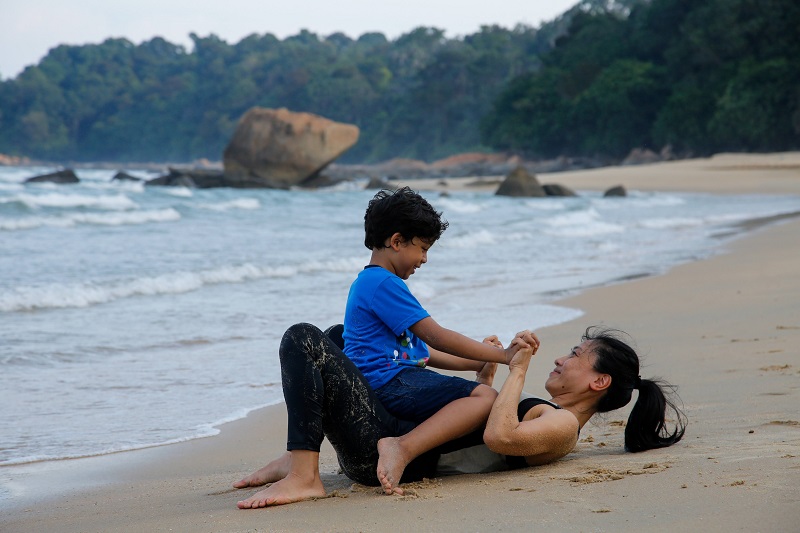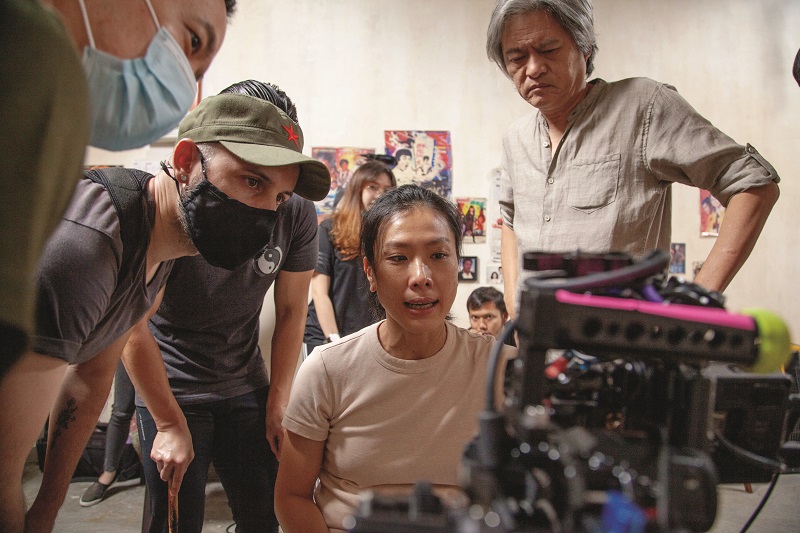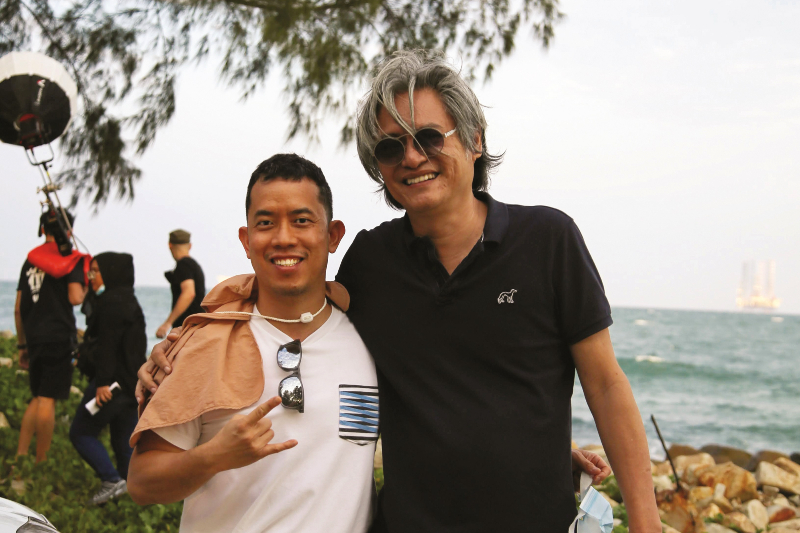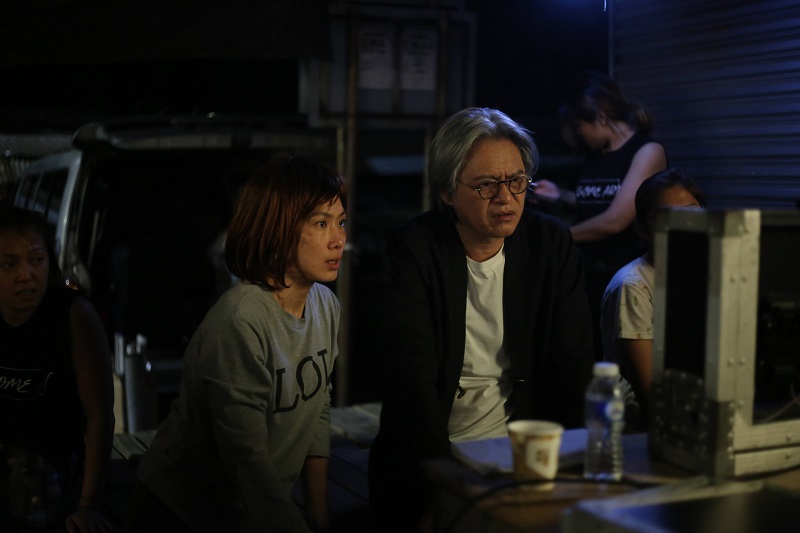
Tan plays Moon, a former actress who steps in front of the cameras again after her divorce, to regain her sense of self (All photos: Barbarian Invasion)
"Every generation, civilisation is invaded by barbarians. We call them children.” Malaysian director Tan Chui Mui could empathise with the sentiments behind this quote attributed to German-born American political theorist Hannah Arendt, as she transitioned to motherhood.
Tan felt as if she had lost control over her body while carrying her first child. In 2019, she had to take the three-year-old along to Thailand for a test shoot and action training for a feature film she was still scripting then. The tug-of-war between mother and son during that trip found its way into the plot.
Barbarian Invasion won the Jury Grand Prix at the Golden Goblet Awards, held in conjunction with the 24th Shanghai International Film Festival. Tan’s third direction after Love Conquers All (2006) and Year Without a Summer (2010), it is produced by Da Huang Pictures, the company she set up in 2004. China’s Manchurian Tiger bagged the other top prize (Best Feature Film) at the June event.
Tan also plays retired award-winning actress Moon in Barbarian Invasion, which gets its kickass action from the martial arts scenes in her character’s comeback movie. Divorced and desperate to regain her sense of self, Moon returns to the silver screen and is offered the leading role. Directing her in the film within a film is Roger, played by Pete Teo, a filmmaker, director, composer and actor who has collaborated with Tan and featured in shorts directed by her. Actor Bront Palarae, of Ola Bola fame, is Moon’s ex-husband Juillard, brought in as the male lead to add interest.
bbi-still-ori-11.jpg

Woo Ming Jin, who has also worked with Tan before, is creative producer of her latest work. “When Mui pitched the story to me, it felt different and fresh — the meta aspect of it, the self-awareness. I thought, perhaps time and being a mother had changed her.”
Woo developed the script with Tan and was involved in the entire production process, from casting to securing the crew, scheduling, scouting for locations and even helping with the action sequences. “She had some difficulties organising all her ideas and material into a cohesive script, and collaboration facilitated the process,” he says.
Years of friendship has equipped them with a sort of “shorthand” in terms of film language. “I understood what she was trying to create, so I was her ‘eyes’ while she was acting, looking at the shots and helping her with certain decisions.”
Film being a subjective art form, there are always disagreements during production. Conflict is an opportunity to improve but, ultimately, creative decisions are always deferred to the director, Woo says. “I would never want to force my opinion on a director, just as I don’t want a producer to force his opinions on me when I direct. For the most part, we had a great time shooting Barbarian Invasion.”
bbi-bts-12.jpg

This was despite the first Movement Control Order halting production for several months, he adds, then having to get the crew to self-isolate when work resumed. Most of the filming was done in Cherating, Pahang, and Kemaman, Terengganu — the latter location not far from Sungei Ular, Tan’s seaside hometown, near Kuantan.
The fight sequences had Woo worrying about the cast getting hurt. Tan had months of training in multiple disciplines — Brazilian jiu-jitsu, Krav Maga (the Israeli art of self-defence), Muay Thai, taekwondo and boxing. Independent filmmaker James Lee was action director on the set as well as in the movie — he played Master Loh, Moon’s trainer — and there were experienced stunt actors on board. “At the end of the day, we were making a film, so safety was the main priority,” says Woo.
Tan was one of six filmmakers selected for the Back to Basics (B2B): A Love Supreme project funded by Hong Kong International Film Festival Society (HKIFFS) and China’s Heaven Pictures. The initiative challenges them to produce quality works on a low budget. Woo had to source money to complete Barbarian Invasion and is thankful for the grant given by Finas, the Malaysian film-government body. Asked when it will be released locally, he says: “We’re still looking at our options. Our goal is to get it to a few more festivals and see where that takes us.”
bbi-bts-22_1.jpg

Teo says he had a lot of fun fleshing out Roger and developing him as a character. The transition from real life to screen and back could have been tricky, and he and Tan discussed this in pre-production quite a bit. “It required both of us to trust each other’s professionalism and instincts.
“Mui and I go back a long way, and we’ve always had to juggle our relationship as friends and as collaborators. When the camera was rolling, I was Roger the director and she was my actress, period. If I thought any other way, then I couldn’t be doing my job properly. In the end, it felt remarkably smooth and workman-like. It turned out to be very organic.”
Although Barbarian Invasion is driven by Tan’s personal experience, the broader issues are fairly universal, Teo adds. “Many struggle with identity and existential meaning at some stage of their lives, and I was no exception. I can definitely relate to the circumstances that Mui found herself in.”
What was it like working with a director who was also the lead actress?
“It was not difficult for me — all I had to do was focus on being Roger. Mui’s job was far more difficult: Being director and lead actress at the same time was a mad thing to attempt. But it added a huge amount to the meta significance of the film and was critical to its meaning. The most helpful thing for me to do was protect her by doing the best job I could.
bbi-bts-21.jpg

“I’m always clear when I work as an actor that I am primarily there to help realise the director’s vision. I have also worked with Mui enough to respect her creative choices even if I did sometimes disagree with them. It is her film after all.”
Barbarian Invasion has dialogue in Malay, Mandarin and Cantonese. Teo in his tweets said that it sets a great example for the future of Malaysian cinema. Asked to elaborate, he says: “Most Malaysian films are narratives that exist in communal silos. Mono-lingual and culturally hermetic, they do not represent the most interesting thing about us — our linguistic and cultural diversity.”
He does not mean to advocate making films that are akin to tourism advertisements as “that would be dishonest, and dishonesty makes poor art. But to ignore our communal ‘others’ in our stories is no less false. A more honest approach would be to portray our world as we experience it — one dominated by our respective mother cultures, yet intersected with other cultures, even if marginally. It is at these intersections that cinematic magic often happens.”
Barbarian Invasion may be personal to Tan but it speaks to Woo as well. “I love nature and have always had a sense of nostalgia for the time when I was growing up. The film was shot by the sea, one of my favourite places in the world. Making it allowed me to see the ocean in a new light. It was like going back in time. That’s my goal in filmmaking — to go back to a certain time, to relive something and, maybe this time, get it right,” he says.
Watch the trailer below:
This article first appeared on July 5, 2021 in The Edge Malaysia.


